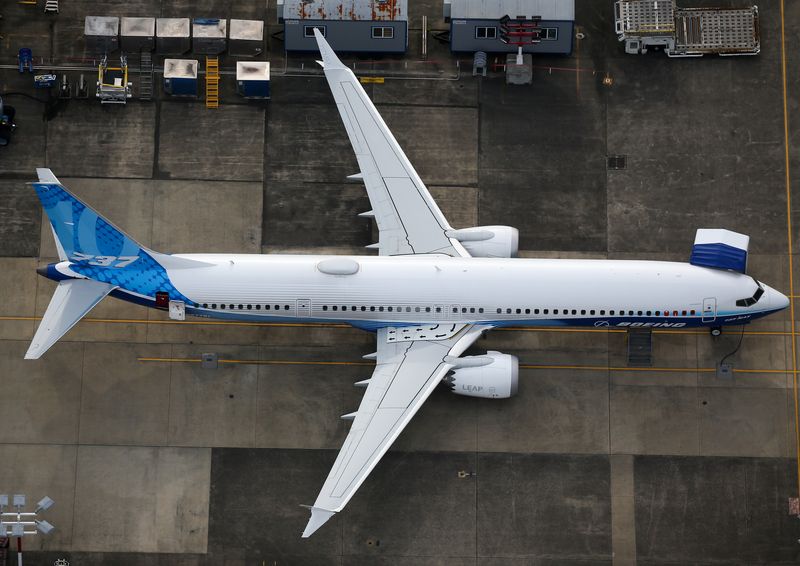By David Shepardson and Tim Hepher
FARNBOROUGH, England (Reuters) -Boeing unveiled orders for dozens of 737 MAX jets on Tuesday as Britain's Farnborough Airshow, back after a four-year pandemic-induced hiatus, braved the hottest day on UK record.
While the second day of one of the industry's biggest events saw a relatively modest flow of orders, the minds of most aviation bosses were focused on fixing broken supply chains - and ducking from one air-conditioned chalet to another.
Stabilising fractured supply chains rather than adding to bulging order books is the main focus of this year's event, though Boeing (NYSE:BA) is keen to shore up its 737 MAX programme with deals following a safety crisis and regulatory issues.
Miami-based airline investor 777 Partners ordered 30 MAX in a deal that could rise to 66 planes if options are exercised.
That comes after a deal for 100 MAX 10 airliners from Delta Air Lines (NYSE:DAL) on Monday - a boost for a model whose future has been clouded by an elusive year-end deadline for certification in time to avoid costly rule changes.
"I think you can check the reboot box and now we're just into the normal Boeing versus Airbus continuing to compete hard for each customer," Boeing Commercial Airplanes CEO Stan Deal told reporters.
Lessor ACG ordered 12 737 MAX while Delta Air Lines placed an order for 12 A220 jets from Airbus.
Regional planemakers Embraer and ATR also announced deals.
Still, the volumes seen so far pale in comparison with former events. Cancelled in 2020 due to COVID-19, the biennial event saw headline deals worth more than $190 billion when last held in 2018.
"Despite record heat, no record-breaking orders," Jefferies analysts said in a note.
Boeing sold five 787-9 Dreamliners to AerCap, taking the leasing giant's fleet of 787s owned or on order to 125.
Airbus was expected to confirm an order for 56 narrowbody jets from easyJet (LON:EZJ) on Wednesday.
Contesting with Paris' Le Bourget as the world's biggest airshow, usually crammed with dealmakers in golf buggies, Farnborough stood relatively quiet as executives mingled inside temporary chalets.
The show itself brought reminders of a problem-strewn recovery from COVID-19 with train disruptions and London airports facing ongoing delays, a day after the runway at Luton Airport, used chiefly for tourism, melted on Monday and added to delays.
The conditions underscored the challenges of meeting net zero emission targets after British Prime Minister Boris Johnson opened the event on Monday calling for renewed efforts to tackle a "carbon tea cosy" stifling the planet.
CHALLENGING TIME
"There are things that are outside our control," easyJet CEO Johan Lundgren told reporters on Tuesday.
"We can't help it if runways are closed down because they're melting. We have help if air traffic control puts restrictions into the flow system," he said. "But the things that actually are within our control, that's been stabilised."
Farnborough marks the aviation's biggest meeting since the outbreak of COVID-19 pummeled air travel and fractured supply chains, with parts makers struggling to get back up to speed.
"We have an industry grappling with a downturn and (then) a bounce-back at a challenging time for the economy," the head of conglomerate General Electric (NYSE:GE), Larry Culp, said on Monday.

Rival engine maker Pratt & Whitney pledged to get engine deliveries to Airbus for its A320 series back on track by early 2023.
For airlines the battle back from the impact of the pandemic will likely take until next year, said Tim Clark, president of Emirates, which has clashed with London's Heathrow over enforced capacity cuts stemming from staffing shortages at the airport. This year the airline industry must simply "tough it out", Clark said on Monday.